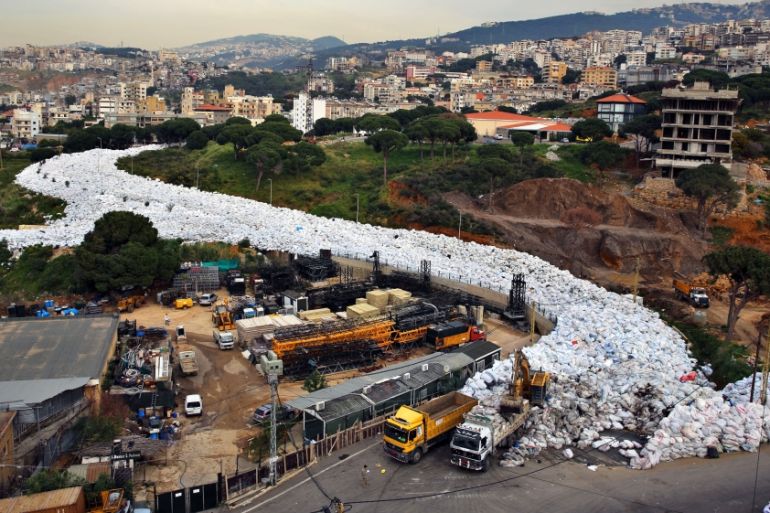Rubbish pickup resumes in Lebanon in bid to end crisis
Dozens of trucks begin carrying rubbish swamping Beirut to landfills as temporary solution to eight-month crisis.

The Lebanese government has launched a bid to dispose of the mountains of rubbish swamping the suburbs of the capital Beirut, in what residents hope will lead to the end of the country’s eight-month garbage crisis.
On Saturday, dozens of trucks started carrying rubbish to the Naameh landfill just south of the city – one of three landfills opened as part of a temporary solution announced by the government a week ago.
Keep reading
list of 4 itemsTurtles swimming to extinction in Malaysia as male hatchlings feel heat
Could shipping containers be the answer to Ghana’s housing crisis?
Thousands protest against over-tourism in Spain’s Canary Islands
The government said that Naameh, the country’s main landfill, will open again for just two months. The crisis began in July, when the landfill was scheduled to close with no realistic alternatives.
Residents of the Naameh area said the dump was over capacity and began blocking the roads to prevent rubbish trucks from reaching it.
Despite anger by residents, there were no protests against the reopening of the landfill on Saturday.
In the north Beirut suburb of Jdeideh, home to one of the largest rubbish piles, a bulldozer loaded thousands of rubbish bags into trucks.
READ MORE: How Lebanon’s rubbish spurred a budding revolution
Fadwa Saad had to wear a mask to avoid the smell of the rubbish that could be seen from her balcony.
“We are coughing, we have allergies and there are mosquitoes and flies in our homes,” she told the AP news agency. “They say they are removing trash. We hope that they really remove it, not only do it for one day and leave the rest.”
As rubbish began piling up in Beirut last year, protesters formed the “You Stink” movement, demanding sweeping reform in Lebanon’s government – blamed for the mismanagement and neglect that led to the rubbish buildup and failure to act against it.
Since the peaks of the protest in the summer, authorities managed to blunt the public anger by ensuring that the streets of Beirut were kept relatively rubbish-free. However, the rubbish was instead pushed to the city’s periphery, where it piled up along roadsides and the banks of the Beirut River.
![The trash crisis has seen public anger rise against the government, which many view as dysfunctional and corrupt [AP]](/wp-content/uploads/2016/03/94ad84bc83964a3aab560cd5af8f1908_18.jpeg)